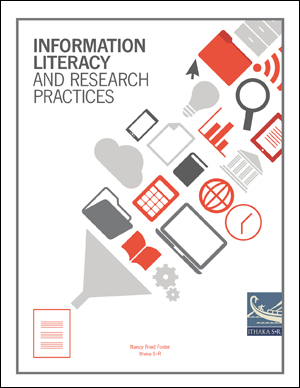Information Literacy and Research Practices
Yesterday, ACRL released the third draft of the Framework for Information Literacy for Higher Education and called upon the community to provide additional feedback.
Against this backdrop, our latest issue brief is particularly timely. In “Information Literacy and Research Practices,” Nancy Fried Foster, Ithaka S+R’s senior anthropologist, demonstrates how “researchers in the wild” are adhering to many of the goals described in the draft Framework. While recognizing that the move away from the Information Literacy Competency Standards for Higher Education, in place now for nearly 15 years, has not been without debate, Foster argues that the Framework “captures more realistically what information-literate people really do and, despite the controversies, represents a significant step forward in the incorporation of a sophisticated understanding of scholarly work practice into the fundamentals of librarianship.”
Interested? Download “Information Literacy and Research Practices.”

Comments
Thank you for this thoughtful overview with comparisons between the Standards and Framework. I think there have been so many changes in the fifteen years since the Standards were developed that any single technological change, much less a combination of all of them - smartphones, Google, OA, ebooks, etc. - combines to dramatically change research practices. The fundamental principle that has not changed is the need to effectively work with students to help them learn and understand one of the points you make in Case Three - "The ability to recognize reliable information..." Finding and recognizing "reliable information" is the underlying principle that connects both the Standards and the Framework. Students don't have the same scholarly personal networks that faculty have, and we need to help them bridge that gap during their years in college until they can find and learn how to use the professional networks that will support their own personal and professional lifelong learning needs. I agree we need to work more closely with faculty to learn their research practices, but primarily to help them understand why teaching students how to develop their own research skills is so critical during their college years. It needs to be a collaborative effort across all the disciplines.
Dear Dr. Foster, I just read your piece about Information Literacy and Research Practices. I was a bit put off about your assumptions regarding academic librarians. You see, your plea that we librarians learn how “real researchers do research” is a bit patronizing because many of us actually do “real research” as part of our profession. Academic Librarians in many institutions have faculty status and go through promotion and tenure processes. We have to publish research in peer reviewed journals. We are very much a part of the faculty governance system and the process of peer evaluation at our institutions. Much of what you say in your piece implies that we do not know how recursive the research and writing process is, nor do we engage in that process ourselves just because of the way in which the old Standards are constructed. That assumption is a big stretch. The re-working of the Standards is not borne out of a desire to match information literacy with what “real researchers” do because we were ignorant about what they do, but out of the desire to make the standards a more current. flexible reflection of where our profession has gone in the past fourteen years. I suggest that next time you write about librarians, you investigate more rigorously what “real librarians do” and be less whiggish in your analysis. Sincerely, Susan Ariew